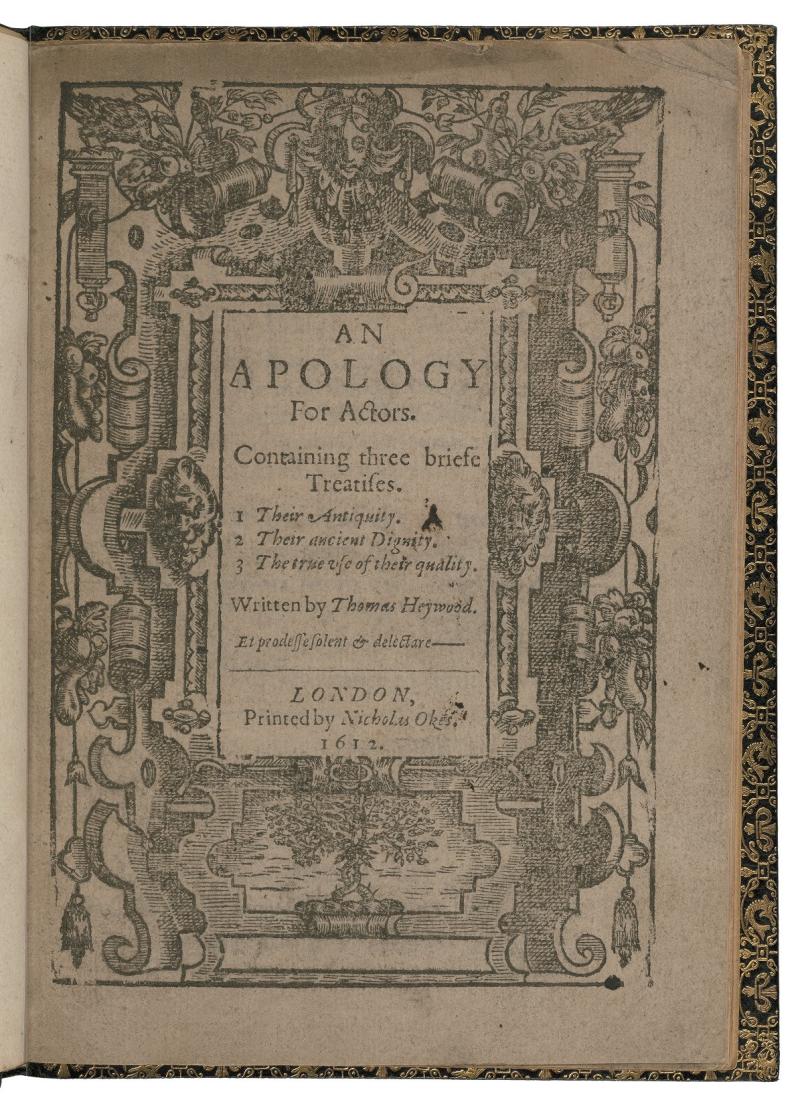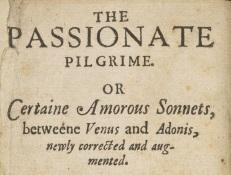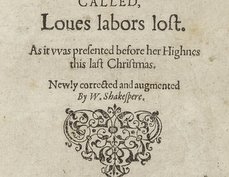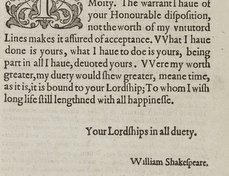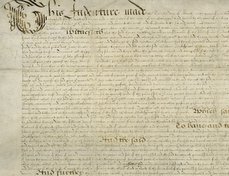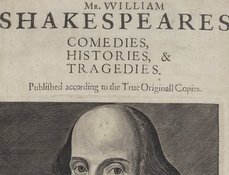Terms of use
Images that are under Folger copyright are licensed under a Creative Commons Attribution-ShareAlike 4.0 International License. This allows you to use our images without additional permission provided that you cite the Folger Shakespeare Library as the source and you license anything you create using the images under the same or equivalent license. For more information, including permissions beyond the scope of this license, see Permissions. The Folger waives permission fees for non-commercial publication by registered non-profits, including university presses, regardless of the license they use. For images copyrighted by an entity other than the Folger, please contact the copyright holder for permission information.
Copy-specific information
Creator: Thomas Heywood
Title: An apology for actors. Containing three briefe treatises. 1 Their antiquity. 2 Their ancient dignity. 3 The true vse of their quality. Written by Thomas Heywood.
Date: London : printed by Nicholas Okes, 1612.
Repository: Folger Shakespeare Library, Washington, DC
Call number and opening: STC 13309 copy 1, title page & sigs. G3v-4v
View online bibliographic record
Adam G. Hooks, "An Apology for Actors: Thomas Heywood's reply to Passionate Pilgrim," Shakespeare Documented, https://doi.org/10.37078/192.
Folger Shakespeare Library, STC 13309 copy 1. See Shakespeare Documented, https://doi.org/10.37078/192.
In An Apology for Actors, published in 1612, Thomas Heywood, a poet and playwright contemporary to Shakespeare, complains about William Jaggard’s The Passionate Pilgrim and appears to imply Shakespeare’s grievances as well.
When William Jaggard published a third edition of The Passionate Pilgrim in 1612, he continued to advertise “By W. Shakespeare.” on its title page. Although Shakespeare probably wrote just five of its poems, he is therefore credited as the author of the whole work. Jaggard also included new additions as well, noting on the title page that two “Loue-Epistles” between the figures of Paris and Helen were included.
Jaggard found the two Paris and Helen poems in Thomas Heywood’s Troia Britanica, or Great Britaines Troy, which Jaggard himself had published three years earlier, in 1609. Heywood, who knew Shakespeare’s work well, did not approve of Jaggard’s attempt to entice customers by appropriating his poetry. However, since Jaggard had established his rights to Heywood’s work, Heywood had no recourse except to attach an angry letter to a work produced by another stationer.
In An Apology for Actors, printed by Nicholas Okes, shown here, Heywood complained about the errors in Troia Britanica, blaming Jaggard’s “disworkmanship.” Heywood also recounted another “manifest iniury done me in that worke, by taking the two Epistles of Paris to Helen, and Helen to Paris, and printing them in a lesse volume, vnder the name of another”—meaning that Heywood’s poems had been published in The Passionate Pilgrim and attributed to Shakespeare. As a result, Heywood fears this “may put the world in opinion I might steale them from him.” That is, people might think Heywood stole poems originally written by Shakespeare, and incorporated them into Troia Britanica.
Heywood then seems to imply that Shakespeare himself took offense at Jaggard’s inclusion of the poems in a volume attributed to him: “the Author I know much offended with M. Iaggard,” because Jaggard had “altogether vnknowne to him presumed to make so bold with his name.”
The Bodleian 1612 edition of The Passionate Pilgrim includes an extant cancel title page without Shakespeare’s name. This may indicate either that Jaggard initially forgot to include the name, or that he subsequently chose to remove it. This was perhaps in response to the offense it caused Heywood and/or Shakespeare.
Because Shakespeare never directly expressed an interest or investment in his own status and ambition as an author in print, scholars have interpreted the remark Heywood attributed to him as crucial evidence that allows us to access Shakespeare’s own attitudes. Heywood’s remarks do not demand this interpretation, though—he was far from a disinterested observer, and even if his story is true, it demonstrates nothing more than that Shakespeare’s reputation was determined by stationers, and not by the author.
The copy shown here is one of eighteen extant copies included in the English Short Title Catalogue.
Written by Adam G. Hooks
Sources
Lukas Erne, Shakespeare and the Book Trade (Cambridge: Cambridge University Press, 2013).
Adam G. Hooks, Selling Shakespeare: Biography, Bibliography, and the Book Trade (Cambridge: Cambridge University Press, 2016).
Last updated January 25, 2020

